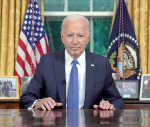You are here

Simon Johnson
By Simon Johnson - Feb 01,2017
US President Donald Trump has an obvious problem with data that he does not like, as he showed on his first full day in office, by attacking the media for reporting accurately the size of the crowd that attended his inauguration.It should be no less obvious that this same relianc
By Simon Johnson - Nov 02,2016
With the United States’ presidential election on November 8, and a series of elections and other political decisions fast approaching in Europe, now is a good time to ask whether the global economy is in good enough shape to withstand another major negative shock.The answer, unfo
By Simon Johnson - Oct 02,2016
Donald Trump has finally put out a detailed economic plan.Authored by Peter Navarro (an economist at the University of California-Irvine) and Wilbur Ross (an investor), the plan claims that a president Trump would boost growth and reduce the national debt.But the plan is based on
By Simon Johnson - Apr 03,2016
On June 23, the United Kingdom will hold a referendum on whether to leave the European Union.On the economic side of the “Brexit” debate are three main questions: Do European rules impose growth-stifling regulation on the UK?Would leaving the EU increase opportunities for British
By Simon Johnson - Feb 07,2016
The Caribbean island of Puerto Rico — the largest United States “territory” — is broke, and a human calamity is unfolding there.Unless a constructive course of political action is found in 2016, Puerto Rican migration to the 50 states will rival the scale of the 1930s Dust Bowl e
By Simon Johnson - Feb 04,2016
The Trans-Pacific Partnership (TPP), the far-reaching trade and investment agreement that the United States has negotiated with 11 other countries, including Canada, Mexico, Japan, Malaysia, Australia and Vietnam, is now up for debate.In order to enter into effect, the US Congres
By Simon Johnson - Oct 04,2015
Ever since the financial crisis erupted in 2008, media outlets and specialists alike have devoted much attention to anticipating negative shocks to the global economy.Today, the focus is on the state of the Chinese economy, the timing of the US Federal Reserve’s normalisation of
By Simon Johnson - Aug 08,2015
Nearly seven years after the global financial crisis erupted, and more than five years after the passage of the Dodd-Frank financial-reform legislation in the United States, the cause of the crisis — the existence of banks that are “too big to fail” — has yet to be uprooted.
By Simon Johnson - Apr 19,2015
Is it appropriate to use trade agreements to discourage countries from using large-scale intervention in the foreign-exchange market to hold down their currencies’ value?
That is the question of the day in American economic-policy circles.
In recent years, Japan, South Ko
By Simon Johnson - Mar 15,2015
For the past six years, US President Barack Obama’s administration has, more often than not, sided with the interests of big banks on financial-sector policy.
But last week, announcing a new proposal to prevent conflicts of interest in financial advising, Obama seemed to t












